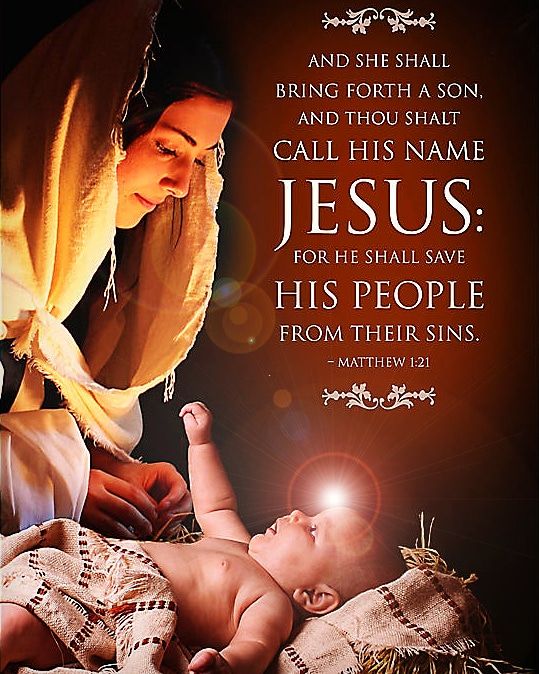THE SEED
“And she shall bring forth a son, and thou shalt call his name JESUS: for he shall save his people from their sins.” Matthew 1:21
In the announcement of Jesus’ birth, Matthew 1:21 summarises the deep purpose of His coming—to save people from their sins. This divine mission carries eternal significance, revealing God’s love and redemptive plan. Turn to Luke 2:8-14, and we witness the angelic proclamation to the shepherds. In verse 11, the angel declares the fulfilment of Matthew’s prophecy, introducing Jesus as the Savior. The heavenly chorus reinforces the profound impact of His birth—peace on earth, and goodwill toward men. As we progress on our pilgrim on earth, let us ponder the purpose behind the manger scene, not only in the Christmas seasons but daily on our way to Heaven. He came not only to dwell among us but to be the ultimate sacrifice for our sins. The babe in the manger foreshadows the Savior on the cross, offering redemption and reconciliation with God. May the mention of the name of Jesus bring us always to remember the purpose of His birth and may our Christian gatherings be of profound reflection on the purpose of His birth—a divine rescue mission for our souls. Rejoice, for in Jesus, we find salvation, peace, and the boundless goodwill of our heavenly Father.
BIBLE READINGS: Luke 2:8-14
PRAYER: Heavenly Father, we thank You for Jesus’ birth—to save us from our sins. May our celebrations reflect the profound significance of this gift in Jesus name. Amen.
E RANTI IDI IBI RE NIGBAGBOGBO
IRUGBIN NAA
“Yóò sì bí ọmọkùnrin kan, ìwọ yóò sì pe orúkọ re ní JESU: nítorí òun ni yóò gba àwọn ènìyàn re là kúrò nínú eṣe wọn.” Mátíù 1:21
Nínú ìkéde ìbí Jésù, Mátíù 1:21 ṣàkópo ète jíjinle dídé re láti gba àwọn ènìyàn là kúrò nínú eṣẹ̀ wọn. Ise apinfunni atọrunwa yii ni o ni pataki ayeraye, ti n ṣafihan ifẹ Ọlọrun ati eto irapada. Ṣí i sí Lúùkù 2:8-14 , a sì rí bí áńgelì ṣe kéde fún àwọn olùṣo àgùntàn náà. Ní ẹsẹ 11 , áńgelì náà polongo ìmúṣẹ àsọtele Mátíù, ó fi Jésù hàn gege bí Olùgbàlà. Ẹgbe akọrin ti orun ń fún ipa jíjinle tí ìbí re ní lókun—àlàáfíà lórí ile ayé, àti ìfe inú rere sí ènìyàn.Bí a ṣe ń te síwájú lórí arìnrìn àjò wa lórí ile ayé, ẹ je kí a ronú lórí ète tí ó wà leyìn ibi ibùjẹ ẹran, kìí ṣe ní àwọn àkókò Keresimesi nìkan ṣùgbon lójoojúmo ní onà wa lọ sí orun. Oun ko wa lati gbe laarin wa nikan ṣugbọn lati jẹ ẹbọ ti o ga julọ fun awọn ẹṣẹ wa. Ọmọ ikoko ti o wa ni ibùjẹ ẹran ṣe afihan Olugbala lori agbelebu, ti o funni ni irapada ati ilaja pẹlu Ọlọrun. Didaruko Jesu mu wa nigbagbogbo lati ranti idi ibi Rẹ ati pe ki awọn apejọ Kristiani wa jẹ ironu ijinlẹ lori ibi re, ise igbala atọrunwa fun awọn ẹmi wa. Ẹ yo, nítorí nínú Jésù, a rí ìgbàlà, àlàáfíà, àti ìfe inú rere àìlópin ti Baba wa orun.
BIBELI KIKA: Lúùkù 2:8-14
ADURA: Baba Ọrun, a dupẹ lọwọ Rẹ fun ibi Jesu lati gba wa la lọwọ awọn ẹṣẹ wa.
